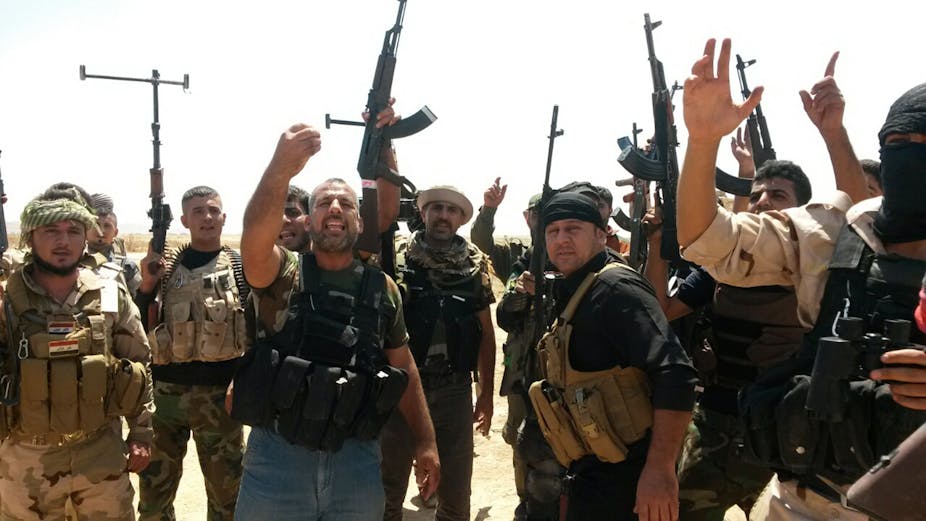As the Islamic State (IS) continues to gain ground, it is largely Kurdish territory that they are taking in northwestern Iraq. One result of the conflict has been to bring close military co-operation between Kurds across state boundaries.
From Iraq, there are the Peshmerga forces; from Syria, the People’s Defence Units (YPG) and from Turkey, guerrilla fighters from the Kurdistan Workers’ Party (PKK). Their joint efforts, with the aid of the targeted air strikes by the US Air Force, have managed to halt IS advances and regain the control of the towns of Makhmour and Gwer.
In the days ahead, as the momentum of the fight against the IS in Iraq and Syria gathers pace, the Kurds will be at the forefront. But doubts remain whether the Kurdish forces will be effective and whether they can sustain unity in the face of this serious challenge.
IS vs the Kurds
It has been reported that as many as 500 Yazidis were killed by the jihadists and 300 Yazidi women have been taken as slaves. Tens of thousands of Yazidis have been displaced, with many taking refuge on Mount Sinjar. Numbers have now been escorted to safety in Kurdish-controlled areas in Syria by the YPG fighters.
As the plight of the Yazidis shows, the Kurdish population in Syria and Iraq is one of the main targets of IS violence. As the state they seek to carve out in Syria and Iraq includes large parts of Kurdish territory, we can expect the violence to continue, if not intensify.
In need of support
The Kurds’ ability to defeat the IS will largely depend on the arrival of more effective weapons and ammunition, as has been voiced by the president of Kurdistan Region, Massoud Barzani. The retreat of Peshmerga forces in the face of initial attacks can be put down to the superiority of the weapons IS captured from the Iraqi army in June 2014, as well as the Peshmerga’s limited combat experience.
So, the Kurds will welcome the consensus that slowly seems to be emerging in the West to supply them directly with weapons.
Co-ordinating efforts
In addition to the arrival of better weapons and more ammunition, Kurdish prospects in the conflict with IS depend also on whether closer co-operation and co-ordination between different Kurdish forces will be maintained. Currently, the Peshmerga forces do not have very effective command structures, with party loyalties to either the Kurdistan Democratic Party (KDP) or the Patriotic Union of Kurdistan (PUK) still prevailing among the fighters, which is proving to be a major weakness.
The involvement of the YPG forces, who are generally considered as the PKK’s branch in Syria further complicates the situation on the ground, as does the arrival of the PKK guerrillas. Nonetheless, numbering around 50,000 fighters, the YPG is a significant force and is so far proving to be effective against the IS who it has also been fighting in Syria.
Similarly, with years of combat experience gained fighting against the Turkish army, the PKK guerrillas are also proving to be effective fighters and took a leading role in the recapture of Makhmour. The PKK’s involvement, however, could potentially sway US or European attitudes against arming the Kurds given it remains listed as a terrorist organisation in many western countries. Also, how Turkey will react to the PKK’s involvement remains to be seen, but it is likely to be viewed with growing concern.
Kurdish unity
Intra-Kurdish relations have not always been cordial. In the past year, the Syrian Kurdish PYD has accused the Iraqi Kurdistan Region of imposing a trade blockade on the Kurds in Syria. The PKK in Turkey has on numerous occasions criticised the Iraqi Kurdish authorities for their unwillingness to help Kurds in Syria. The PYD in turn was accused of suppressing other Kurdish political parties in Syria, such as those allied to the KDP.
Last year, representatives of Kurdish political movements from Iraq, Iran, Syria and Turkey met in Erbil to take steps to convene a Kurdish National Congress. Eventually their efforts were abandoned in the face of major differences.
Ultimately, the possible emergence of the Kurds as a significant regional actor depends on their ability to forge a common Kurdish position. This requires a higher degree of political unity amongst the various movements than currently exists. But the need for unity in fighting IS will no doubt help forge trust between them, as their survival calls for closer co-operation.

